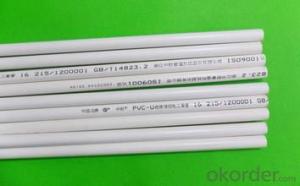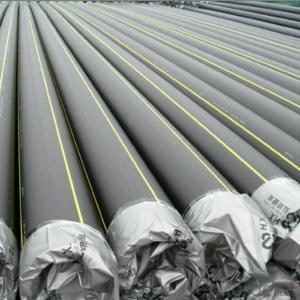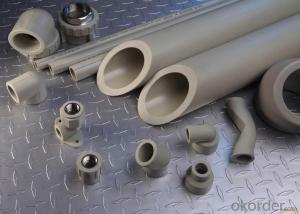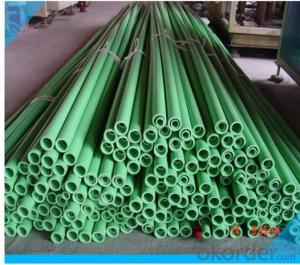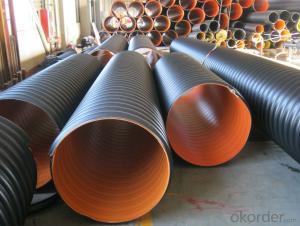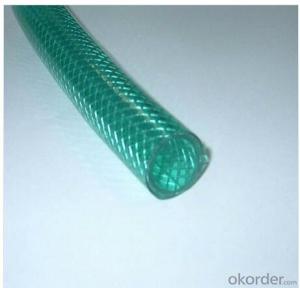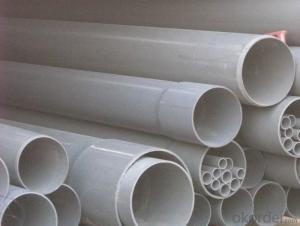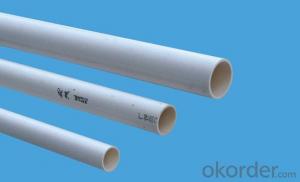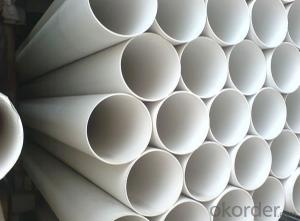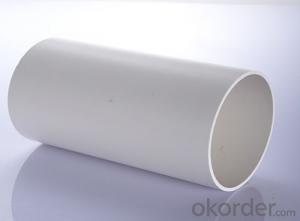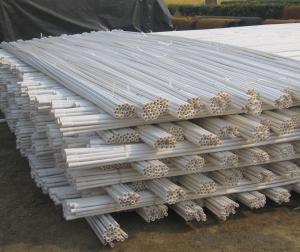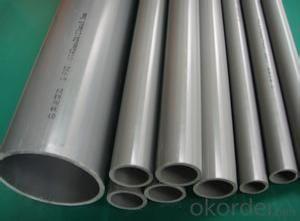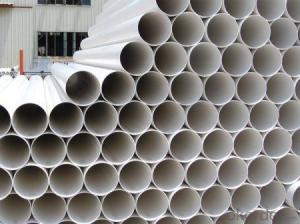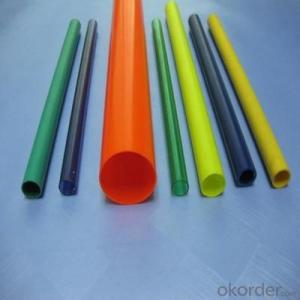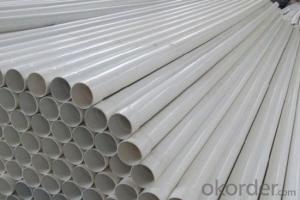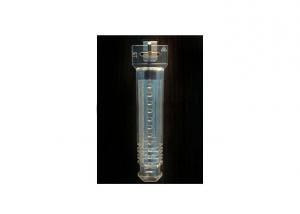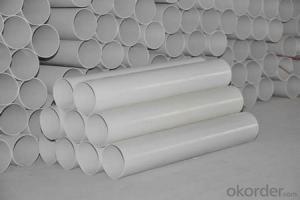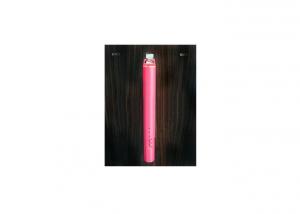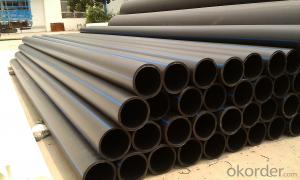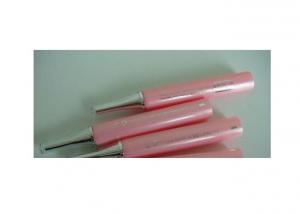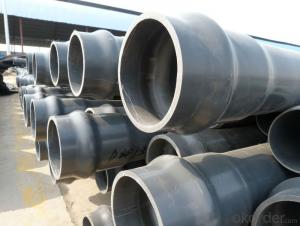ISO14001 PVC Plastic Tubes - 16-630mm Diameter, 5.8/11.8m Length, GB Standard
- Loading Port:
- Tianjin
- Payment Terms:
- TT OR LC
- Min Order Qty:
- 1 m
- Supply Capability:
- 9999 m/month
OKorder Service Pledge
OKorder Financial Service
You Might Also Like
Quick Details
Place of Origin: Beijing, China (Mainland) Material: PVC Specification: 16-630mm Length: 5.8/11.8M Standard: GB
Packaging & Delivery
Packaging Details: coils in plastic bag
Delivery Detail: 15- 20 days
Specifications
PVC Pipe
1,16-630mm;
2, Wall thickness:1.6mm-26.7mm;
3, Pn:0.63-2.0MPa;
4, Length:5.8/11.8M
Features:
**Sizes: 16 to 630mm
**Pressure Rating: 0.6MPa, 0.8MPa, 1.0MPa, 1.25MPa, 1.6MPa
**Colors: white, grey, red or other colors on request
**Connection: socket fusion joint
**Standard: GB
**Certification: ISO9001, ISO14001
**Packaging: coils in plastic bag or as your request
Advantages:
**Corrosion Resistant: resist chemical matters or electron chemical corrosion
**Higher Flow Capacity: smooth interior walls result in lower pressure loss and higher volume than metal fittings
**Lower Installation Costs: light weight and ease of installation can reduce installation costs by as much as 50% over metal fittings
**Longevity: more than 50 years under proper use
**Environment-friendly: PVC-U drainage fittings can be recycled
Application
water pipe network system, industrial liquids transportation, Agricultural irrigation pipe and sewage treatment
- Q: Can plastic tubes be used for storing pharmaceuticals?
- Yes, plastic tubes can be used for storing pharmaceuticals. They are commonly used for packaging and storing various types of medications such as creams, ointments, and gels. Plastic tubes provide a convenient and secure way to store and dispense pharmaceutical products, ensuring their stability, protection, and easy administration.
- Q: I have a Katadyn Vario pump for camping and haven't used it in eons (7 years or so) and I took it apart to clean it.For now, and for future reference, how can I clean the actual intake/outlet plastic tubes? The inlet tube is inserted into gross pond/lake or running stream water, so it's already contaminated. I would love to be able to wash this tube for SURE, safely at home.(The O-rings are still well-lubed, and I've ordered new activated carbon to refill the glass fiber filter.)
- Here is what the manual says; Between trips, run a liter of water with two teaspoons of household bleach through the pump. Pump the unit, remove the cartridge from the housing, dry and store. Before next use, pump a liter of fresh water through the system to flush. See use-and-care manual for field tips and detailed instructions.
- Q: Do plastic tubes have any limitations in terms of shape or design?
- Yes, plastic tubes do have limitations in terms of shape and design. They are typically manufactured in cylindrical shapes due to the nature of their production process, which involves extrusion or injection molding. While it is possible to create variations such as oval or rectangular tubes, these options are more limited and less common. Additionally, complex designs or intricate shapes may not be feasible or cost-effective to produce using plastic tubing.
- Q: What are the common thicknesses for insulation plastic tubes?
- The common thicknesses for insulation plastic tubes vary depending on the specific application and insulation requirements. However, typical thicknesses for insulation plastic tubes range from 1/8 inch (3.2mm) to 1/2 inch (12.7mm).
- Q: How do you prevent plastic tubes from deteriorating?
- To prevent plastic tubes from deteriorating, it is important to store them properly, away from direct sunlight and extreme temperatures. Regular cleaning and maintenance should also be done to remove any chemical residues or debris that might cause degradation. Additionally, using the appropriate type of plastic for the intended application and avoiding exposure to harsh chemicals can help prolong the lifespan of the tubes.
- Q: Are plastic tubes suitable for high-viscosity products?
- Yes, plastic tubes are suitable for high-viscosity products. Plastic tubes can be made from materials such as HDPE or LDPE, which have excellent chemical resistance and can handle high-viscosity products without deforming or leaking. Additionally, plastic tubes can be designed with specific features such as wider diameters or thicker walls to accommodate the flow of high-viscosity products effectively.
- Q: If you had 32 plastic test tubes, what would you use them for?
- making test tube babies.
- Q: What are the different closure options for snap-on tubes?
- The different closure options for snap-on tubes include screw caps, flip-top caps, snap-on caps, and press-on caps.
- Q: Can plastic tubes be used for vacuum systems?
- Yes, plastic tubes can be used for vacuum systems. However, it is important to select the appropriate type of plastic that can withstand the pressure differential created by the vacuum. Additionally, the plastic tubes should have low outgassing properties to avoid contamination in the vacuum system.
- Q: Are plastic tubes BPA-free?
- Some plastic tubes are BPA-free, but it depends on the specific type of plastic used.
Send your message to us
ISO14001 PVC Plastic Tubes - 16-630mm Diameter, 5.8/11.8m Length, GB Standard
- Loading Port:
- Tianjin
- Payment Terms:
- TT OR LC
- Min Order Qty:
- 1 m
- Supply Capability:
- 9999 m/month
OKorder Service Pledge
OKorder Financial Service
Similar products
Hot products
Hot Searches
Related keywords
